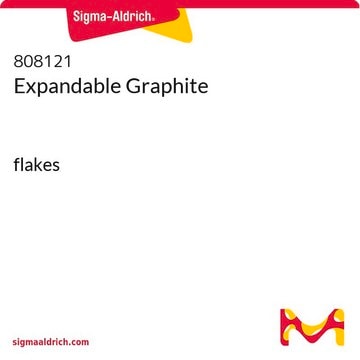496588
Graphite
powder, <150 μm, 99.99% trace metals basis
Se connecterpour consulter vos tarifs contractuels et ceux de votre entreprise/organisme
About This Item
Formule empirique (notation de Hill):
C
Numéro CAS:
Poids moléculaire :
12.01
Numéro CE :
Numéro MDL:
Code UNSPSC :
12352103
ID de substance PubChem :
Nomenclature NACRES :
NA.23
Produits recommandés
Qualité
battery grade
Niveau de qualité
Pureté
99.99% trace metals basis
Forme
powder
Poids mol.
Mw 12.011 g/mol
Composition
C
Taille des particules
<150 μm
Pf
3652-3697 °C (lit.)
Densité
2.26 g/cm3 (lit.)
Application(s)
battery manufacturing
Chaîne SMILES
[C]
InChI
1S/C
Clé InChI
OKTJSMMVPCPJKN-UHFFFAOYSA-N
Vous recherchez des produits similaires ? Visite Guide de comparaison des produits
Code de la classe de stockage
11 - Combustible Solids
Classe de danger pour l'eau (WGK)
nwg
Point d'éclair (°F)
Not applicable
Point d'éclair (°C)
Not applicable
Équipement de protection individuelle
dust mask type N95 (US), Eyeshields, Gloves
Faites votre choix parmi les versions les plus récentes :
Déjà en possession de ce produit ?
Retrouvez la documentation relative aux produits que vous avez récemment achetés dans la Bibliothèque de documents.
Les clients ont également consulté
Craig E Banks et al.
The Analyst, 131(1), 15-21 (2006-01-24)
Different types of carbon based electrodes have emerged over the last few years, significantly changing the scope and sensitivity of electro-analytical methods for the measurement of diverse targets from metal ions through gases to biological markers. This Highlight article shows
Anja Schinwald et al.
Nanotoxicology, 8(8), 824-832 (2013-08-09)
Two-dimensional graphitic carbon, graphene, is a new form of nanomaterial with great potential in a wide variety of applications. It is therefore crucial to investigate the behaviour of graphene in biological systems to assess potential adverse effects that might follow
Kyoung Soon Choi et al.
Journal of nanoscience and nanotechnology, 13(5), 3282-3287 (2013-07-19)
A comparison was performed between the use of graphene oxide (GO) and reduced graphene oxide (rGO) as a hole extraction layer (HEL) in organic photovoltaic (OPV) cells with poly(3-hexylthiophene):phenyl-C61-butyric acid methyl ester. Hydrazine hydrate (HYD) and the thermal method (Thermal)
Sang Tae Park et al.
Proceedings of the National Academy of Sciences of the United States of America, 110(23), 9277-9282 (2013-05-22)
Enhanced image contrast has been seen at graphene-layered steps a few nanometers in height by means of photon-induced near-field electron microscopy (PINEM) using synchronous femtosecond pulses of light and electrons. The observed steps are formed by the edges of graphene
Min Seok Jang et al.
Proceedings of the National Academy of Sciences of the United States of America, 110(22), 8786-8789 (2013-05-15)
Graphene is a room temperature ballistic electron conductor and also a very good thermal conductor. Thus, it has been regarded as an ideal material for postsilicon electronic applications. A major complication is that the relativistic massless electrons in pristine graphene
Notre équipe de scientifiques dispose d'une expérience dans tous les secteurs de la recherche, notamment en sciences de la vie, science des matériaux, synthèse chimique, chromatographie, analyse et dans de nombreux autres domaines..
Contacter notre Service technique







